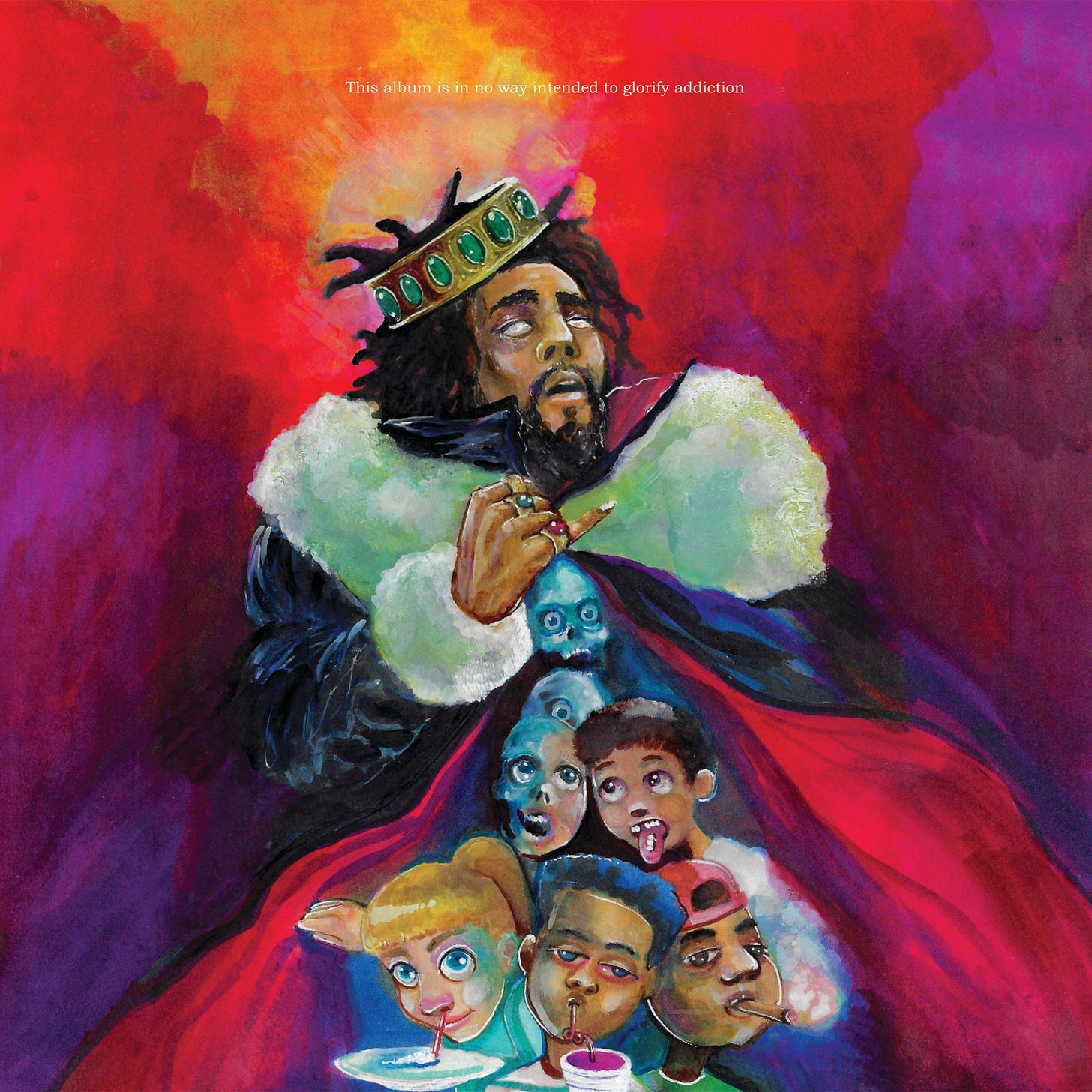Album Review: KOD by J. Cole
On J. Cole’s fifth studio album, the classic, the bite, and the textual force are missing.
Taken from Phil’s defunct blog, The Wax Report, an extensive review of the most important albums, covering everything from production to lyricism and overall cohesiveness.
J. Cole has a whole range of ideas. He came up with this time to give his album a touch of mysticism. KOD, short for “Kids On Drugs,” “King OverDosed,” and “Kill Our Demons,” appears after a private listening session in London completely without announcement and without a promo phase. The only feature is an ominous “kiLL Edward” that quickly turns out to be the alter ego of the protagonist. In addition, there is a weird track list full of cross-references, wild spellings, and a high-trotted album artwork.
After the rather unspectacular 4 Your Eyez Only almost two years ago, KOD makes it clear that Cole wants to deliver once and for all the classic that has been trusted to him for so long. And despite a few of the rapper’s strongest and most diverse performances and a promising concept, the tape lacks the textual power to qualify for a discussion of timelessness.
Already in the opener, a jazz-underlaid robot voice introduces the core thesis of the record: All people have to suffer from life to a certain extent, but they determine the handling themselves. “There are many ways to deal with this pain; choose wisely,” it says before the following tracks illustrate in detail what forms this philosophy can take. Again and again, Cole warns on tracks such as “The Cut Off” or “Once an Addict (Interlude)” of drug use, which offers itself as a simple way out of suffering but ultimately does not represent a long-term solution. As a counter-model, he keeps himself; his success, his skill, his income, and his moral integrity are positive examples on tracks such as “ATM” or “Motiv8” that can be achieved through ambition and determination in life.
It has quite a corn factor, as, of course, Cole sees himself as a perfect role model. Especially if you look at his great conclusion in “Friends”: “Meditate, don’t medicate.” You see! Addictions and psychological problems are not such a big thing. Instead of throwing Molly and Xanax, they should just meditate for a round, and everything is fine again. Apart from the out-of-place advice to a depressed person (“Just go out a little more often again, head up!”), it summarizes the basic problems of KOD quite well.
Cole has far from enough answers to sell this level to Woke, which his fans attribute to him again and again. Tracks like “Brackets” already graze sharper and more concisely formulated criticisms of social injustice, “1985 (Intro to “The Fall Off”)” is a half-cooked implicit diss to Lil Pump’s “Fuck J. Cole” epic, which reacts to stupid trolls with a mixture of grand-brotherly explanatory bear and passive-aggressive preschooler.
Everything is solid, neatly formulated, and neatly rhymed, but it does not get biting enough to portray the heaviness of life or shoot down an entire generation of rappers. The strong lyrical moments usually come about when Cole stacks conceptually deeper. “Photograph” tells an authentic and comprehensible story about love in the digital age, “Once an Addict (Interlude)” impresses with intensive insight into the origin and past of the protagonist.
What the lyrics do not quite achieve in the concept works on a musical level: KOD may sound best of all Cole albums. From subtly implied brass for lively jazz approaches (“Intro,” “Brackets”) to weightless boom-bap piano beats from the clear Nujabes and Dilla school (“1985”, “The Cut Off”) to driving, light-footed trap percussions that are clearly reminiscent of Mike Will Made-It’s “Humble.” instrumental (“KOD”). So, there is significantly more energy than the predecessor, a better and more produced sound than 2014 Forest Hills Drive, and, thanks to the more energetic, more pop in the first half, much more steam than the mixtapes.
Cole’s handling of vocals and voice filters also works on KOD on point. Be it the harmonic accents like on “Kevin’s Heart,” the haunting vocals on “Window Pain (Outro),” or the repetitive, pitch-manipulated bridge passages on “The Cut Off.” He never sounded so experimental, but at the same time, he was as skilled and accurate as here.
Nevertheless, the tape suffers from a similar disease to Big Sean’s I Decided or IDK’s IWASVERYBAD. The desire to deliver a timeless classic, a hip-hop-defining masterpiece, in a sense exceeds the radius of the statements that the artist has on the pan. Cole opens one huge barrel after another and underpins it with gimmicks under and over, only to come to the conclusion in the end that he is really a super great guy.
The widely introduced and repeatedly activated guiding theme of KOD does not bring any special added value to the album, nor does it lead to a satisfactory conclusion. Although correspondingly large tones accompany the big questions, they do not end this arc meaningfully. Accordingly, he does a lot of things right in terms of sound and rap technology but could be more impressed by himself in order to live up to his high ambitions.
Above Average (★★★☆☆)
Favorite Track(s): “Brackets,” “Once an Addict (Interlude),” “Window Pain (Outro)”


